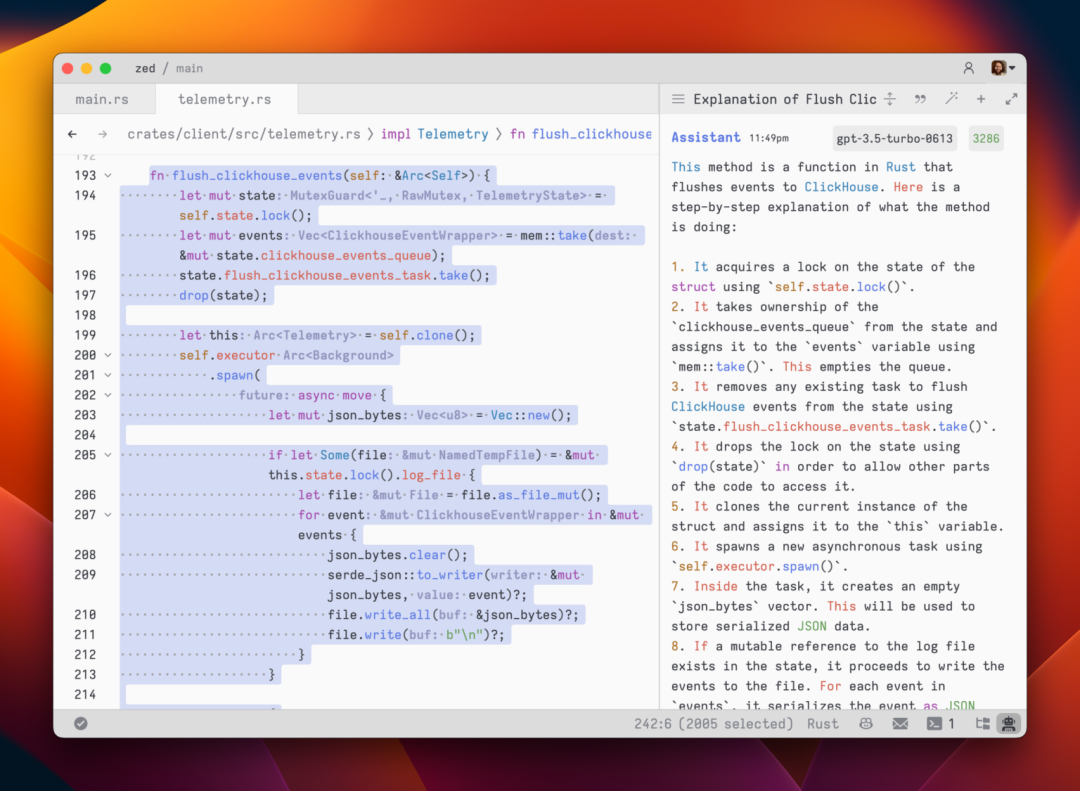As compiled system programming languages, Go and Rust have similarities (compilation, static typing, concurrency support), but there are also differences. Go uses garbage collection for memory management, while Rust uses manual memory management. Syntactically, Go is C language style and Rust is functional style. In terms of package management, Go uses go mod and Rust uses Cargo.

Go and Rust: Similarities and Differences
Go and Rust are both compiled system programming languages and have some similar features. But there are some key differences.
Similarities:
- Compiled type: Go and Rust are compiled into machine code, providing higher execution efficiency.
- Static typing: Both use a static type system, checking for errors at compile time.
- Concurrency support: Go provides excellent concurrency support through goroutines, while Rust provides excellent concurrency support through threads and channels.
Differences:
- Memory management: Go uses a garbage collector to automatically manage memory, while Rust uses manual memory Management, providing memory safety guarantees through an ownership system.
- Syntax: Go uses a C-style syntax, while Rust has a more modern, functional syntax.
-
Package management: Go uses
go modto manage packages, while Rust uses Cargo.
Practical case
Go:
package main
import (
"fmt"
"time"
)
func main() {
// 创建一个 goroutine
go func() {
for {
fmt.Println("Hello from goroutine")
time.Sleep(1 * time.Second)
}
}()
// 主程序继续执行
for {
fmt.Println("Hello from main")
time.Sleep(1 * time.Second)
}
}Rust:
use std::thread;
fn main() {
// 创建一个线程
let handle = thread::spawn(|| {
loop {
println!("Hello from thread");
thread::sleep(std::time::Duration::from_secs(1));
}
});
// 主线程继续执行
loop {
println!("Hello from main");
thread::sleep(std::time::Duration::from_secs(1));
}
} Conclusion
Go and Rust are both modern systems programming languages with different features. Go offers simpler syntax and garbage collection, while Rust focuses on memory safety and performance. Depending on the specific needs, it is important to choose the language that best suits the project.
The above is the detailed content of Similarities and differences between Golang and Rust. For more information, please follow other related articles on the PHP Chinese website!
 如何使用Redis和Rust语言开发缓存预取功能Sep 21, 2023 am 11:57 AM
如何使用Redis和Rust语言开发缓存预取功能Sep 21, 2023 am 11:57 AM如何使用Redis和Rust语言开发缓存预取功能引言:随着Web应用的增长和用户量的增加,缓存成为提高性能的重要手段之一。为了进一步提升缓存的效果,我们可以使用缓存预取功能,即在需要使用缓存的数据之前就提前将其加载到缓存中。本文将介绍如何使用Redis和Rust语言来实现缓存预取功能,并附上具体的代码示例。一、Redis简介Redis是一个基于内存的键值存储
 System76 tips Fedora Cosmic spin for 2025 release with Fedora 42Aug 01, 2024 pm 09:54 PM
System76 tips Fedora Cosmic spin for 2025 release with Fedora 42Aug 01, 2024 pm 09:54 PMSystem76 has made waves recently with its Cosmic desktop environment, which is slated to launch with the next major alpha build of Pop!_OS on August 8. However, a recent post on X by System76 CEO, Carl Richell, has tipped that the Cosmic DE developer
 基于Rust的Zed编辑器已开源,内置对OpenAI和GitHub Copilot的支持Feb 01, 2024 pm 02:51 PM
基于Rust的Zed编辑器已开源,内置对OpenAI和GitHub Copilot的支持Feb 01, 2024 pm 02:51 PM作者丨TimAnderson编译丨诺亚出品|51CTO技术栈(微信号:blog51cto)Zed编辑器项目目前仍处于预发布阶段,已在AGPL、GPL和Apache许可下开源。该编辑器以高性能和多种AI辅助选择为特色,但目前仅适用于Mac平台使用。内森·索博(NathanSobo)在一篇帖子中解释道,Zed项目在GitHub上的代码库中,编辑器部分采用了GPL许可,服务器端组件则使用了AGPL许可证,而GPUI(GPU加速用户界面)部分则采用了Apache2.0许可。GPUI是Zed团队开发的一款
 真快!几分钟就把视频语音识别为文本了,不到10行代码Feb 27, 2024 pm 01:55 PM
真快!几分钟就把视频语音识别为文本了,不到10行代码Feb 27, 2024 pm 01:55 PM大家好,我是风筝两年前,将音视频文件转换为文字内容的需求难以实现,但是如今只需几分钟便可轻松解决。据说一些公司为了获取训练数据,已经对抖音、快手等短视频平台上的视频进行了全面爬取,然后将视频中的音频提取出来转换成文本形式,用作大数据模型的训练语料。如果您需要将视频或音频文件转换为文字,可以尝试今天提供的这个开源解决方案。例如,可以搜索影视节目的对话出现的具体时间点。话不多说,进入正题。Whisper这个方案就是OpenAI开源的Whisper,当然是用Python写的了,只需要简单安装几个包,然
 Rust 增强 PHP:构建更加可靠的 Web 应用程序Sep 15, 2023 am 11:39 AM
Rust 增强 PHP:构建更加可靠的 Web 应用程序Sep 15, 2023 am 11:39 AMRust增强PHP:构建更加可靠的Web应用程序引言:Web应用程序的可靠性对于用户体验和业务的成功至关重要。传统的PHP开发通常存在一些常见的问题,例如内存泄漏、空指针引用等,这些问题可能导致应用程序崩溃或行为不可预测。然而,通过结合Rust和PHP,我们可以将可靠性提升到新的水平,本文将介绍如何使用Rust来增强PHP,构建更加
 聊聊Golang中的几种常用基本数据类型Jun 30, 2022 am 11:34 AM
聊聊Golang中的几种常用基本数据类型Jun 30, 2022 am 11:34 AM本篇文章带大家了解一下golang 的几种常用的基本数据类型,如整型,浮点型,字符,字符串,布尔型等,并介绍了一些常用的类型转换操作。
 如何使用Vue.js和Rust语言构建高性能的物联网和边缘计算应用Jul 29, 2023 pm 11:57 PM
如何使用Vue.js和Rust语言构建高性能的物联网和边缘计算应用Jul 29, 2023 pm 11:57 PM如何使用Vue.js和Rust语言构建高性能的物联网和边缘计算应用引言:物联网和边缘计算的快速发展给我们带来了无限的可能性。作为开发人员,我们迫切需要一种能够有效处理大规模数据和实时响应的技术来构建高性能的物联网和边缘应用。本文将介绍如何使用Vue.js和Rust语言结合开发前端和后端,构建出高性能的物联网和边缘计算应用。一、Vue.js前端开发:Vue.j


Hot AI Tools

Undresser.AI Undress
AI-powered app for creating realistic nude photos

AI Clothes Remover
Online AI tool for removing clothes from photos.

Undress AI Tool
Undress images for free

Clothoff.io
AI clothes remover

AI Hentai Generator
Generate AI Hentai for free.

Hot Article

Hot Tools

mPDF
mPDF is a PHP library that can generate PDF files from UTF-8 encoded HTML. The original author, Ian Back, wrote mPDF to output PDF files "on the fly" from his website and handle different languages. It is slower than original scripts like HTML2FPDF and produces larger files when using Unicode fonts, but supports CSS styles etc. and has a lot of enhancements. Supports almost all languages, including RTL (Arabic and Hebrew) and CJK (Chinese, Japanese and Korean). Supports nested block-level elements (such as P, DIV),

Safe Exam Browser
Safe Exam Browser is a secure browser environment for taking online exams securely. This software turns any computer into a secure workstation. It controls access to any utility and prevents students from using unauthorized resources.

MinGW - Minimalist GNU for Windows
This project is in the process of being migrated to osdn.net/projects/mingw, you can continue to follow us there. MinGW: A native Windows port of the GNU Compiler Collection (GCC), freely distributable import libraries and header files for building native Windows applications; includes extensions to the MSVC runtime to support C99 functionality. All MinGW software can run on 64-bit Windows platforms.

Notepad++7.3.1
Easy-to-use and free code editor

SublimeText3 Linux new version
SublimeText3 Linux latest version







